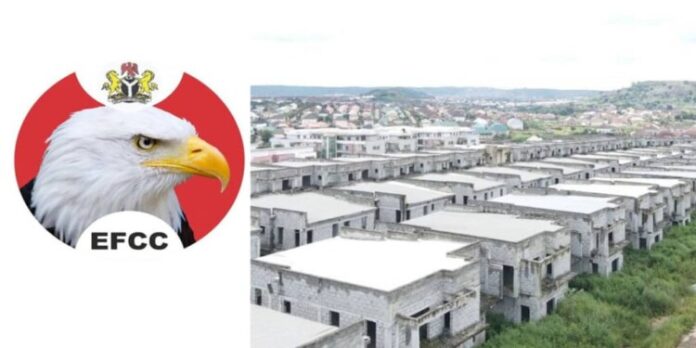The Economic and Financial Crimes Commission (EFCC) has achieved a significant milestone with the final forfeiture of an estate in Abuja, measuring 150,500 square meters and containing 753 units of duplexes and apartments.
This recovery, ordered by Justice Jude Onwuegbuzie, marks the single largest asset recovery by the Commission since its establishment in 2003 [1).
Located on Plot 109 Cadastral Zone C09, Lokogoma District, Abuja, the estate was forfeited to the federal government due to its suspected connection to unlawful activities by a former top government official.
READ ALSO:
Imo Govt increases access to water for rural dwellers after 28-year wait
Nigeria to deepen cooperation with South Africa in infrastructure, mining sectors
Tragedy strikes Ede community as fire outbreak claims family of six
The EFCC relied on Section 17 of the Advance Fee Fraud and Other Fraud Related Offences Act No 14, 2006, and Section 44 (2) B of the Constitution of the Federal Republic of Nigeria to secure the forfeiture.
Justice Onwuegbuzie’s ruling was based on the respondent’s failure to provide justification for retaining the property, which is suspected to have been acquired with proceeds of unlawful activities. The forfeiture was preceded by an interim order secured on November 1, 2024.
The EFCC’s Executive Chairman, Mr. Ola Olukoyede, emphasizes asset recovery as crucial in combating corruption and economic crimes. “Asset recovery is pivotal in the anti-corruption fight; it’s a major disincentive against the corrupt and fraudulent,” he stated.
Dele Oyewale, EFCC Head of Media and Publicity, underscored the challenges of financial crime investigation and prosecution, noting that recovering assets is essential to weakening suspects. “If you allow the corrupt to access proceeds of their crime, they’ll fight you with it,” he said.
This landmark recovery demonstrates President Bola Ahmed Tinubu’s commitment to the anti-corruption war and sets a significant precedent for future asset recovery efforts.

